
11 minute read
RC Madras, UK clubs construct toilet blocks in a school
V Muthukumaran
Astrategic decision was taken by Rotary in India to build toilets and hold health camps in government schools when Census 2011 put the country’s literacy rate at 74 per cent. “In the next 10 years, we constructed 12,000 school toilets and held 24,000 health camps in government schools in our bid to achieve total literacy… that is 95 per cent. So far, we have installed 10,000 smart classrooms across schools in India,” said RI Director AS Venkatesh.
Advertisement
Speaking at a gathering of over 900 students, teachers, district education officials and members of RC Madras, RID 3232, at the inauguration of two toilet blocks — one for the students and the other for the faculty — at the Government High School at Sithalapuram, a city suburb, he said “wherever there are inadequate toilets, girls are vulnerable to diseases and they drop out of school eventually.” At a health camp conducted at a school in Kattankalathur, a southern suburb, “we found that a Class 5 boy, a habitual backbencher and ridiculed by teachers, suffered from an eye disorder and hence could not see what was written on the blackboard. We detected the vision problem, treated it and within a few months, he was a top ranker in his class.” Urging students to study hard and take up meaningful careers, Venkatesh hoped that once they attain a certain status in life, they would help other underprivileged children. To ensure proper maintenance of the toilet block, he said each of the 48 toilet units can be assigned to a class section and “at the end of the year, the school can hold a contest for the best maintained toilets and prizes can be given to students who have done a good job.”
Seeing the happy faces of girl students, “reminds me of my childhood days at my village where girls were reluctant to attend school for many reasons,” said DG J Sridhar. He lavished praise on the club’s




WASH chairman and presidentnominee Ravi Sundaresan for taking up meticulously the work involved in the global grant project which took over 3–4 years to complete.
Giving an overview of the project, Sundaresan said eight entities — RCs Madras, Bath (RID 1200), Croydon Whitgift (RID 1145), Warwick (RID 1060), UK, and their respective RIDs — have come together to construct the toilet blocks worth `30 lakh. The gender-segregated toilet block for students has six handwash stations to practise group handwashing; while another toilet block for staff has two handwash stations. There is availability of adequate water through overhead tanks.
India is one of the countries in the pilot programme launched in 2016 by RI called WASH in Schools Target Challenge which takes up sustainable water, sanitation and hygiene projects in schools that are integrated with the basic education and literacy goals. “RC Madras is taking up WASH projects after following a ‘needs assessment’ at schools. We are able to complete this project with cooperation from the school headmistress, PTA head and the teaching faculty,” said Sundaresan.
With the new sanitation facilities, the school can now accommodate 1,400 students and has surpassed the UNICEF and WHO benchmarks. “It now fulfils one of the prime requirements of a higher secondary school,” he noted. Nalamthana, an NGO, had conducted awareness sessions for students on proper use of the toilets and the need to maintain them. In his address, club president Mohan Raman said he was beholden to past presidents NK Gopinath, SN Srikanth, Ranjit Pratap and Dr Vijaya Bharathi for taking the project through successive stages which “enabled us to inaugurate the grand toilet blocks today.” He assured the faculty that any future demands of the school will be met by the club. “We are ready to install 17 smart classes in different schools; and the classrooms of 12 schools will be revamped with ceiling fans, blackboards and other needbased WASH infrastructure under our Schools into Smiles project which will be completed by April,” said Raman. Adhilakshmi Builders has constructed the sanitation facilities and its proprietor R Rangasamy assured that his firm will provide free maintenance for three years.
District educational officer R Rajasekaran said it was a momentous day for the school which was badly in need of sanitation facilities and thanked the club. K Keerthana (Class 8) smiled and said, “now we don’t need to stand in queue before the toilets. We had earlier four toilets for girls and another 5–6 for boys, but they were in poor shape. The new block will ensure we don’t miss classes.” Headmistress Sweetlin Rani said the school is still in need of eight classrooms, a science lab and a smart classroom. “Right now, we have 14 classrooms with 901 students. Also, the height of the compound wall has decreased with the laying of a new road and it needs to be raised by a few metres.”
When the Rotary project began, they had around 600 students, “but seeing the construction of a new toilet block more parents came forward to admit their wards. The school located in a marshland of 6.7 acres has to contend with wild grass and bushes which need to be cleared and the terrain levelled for creating a playground for the students.

From L: RI Director AS Venkatesh, Vinod Saraogi, DG J Sridhar and club’s presidentnominee Ravi Sundaresan.

The genesis
In 2015, RC Madras initiated an End Polio Now flame voyage across the world under the leadership of the then president SN Srikanth with Rtn NK Gopinath holding the torch as EPN Flame chair. “In the UK leg of the voyage, RC Bath was one of our stops. Rtn David Broughton from that UK club had asked his colleague Rtn Brian Joakim to get in touch with me to talk about this sanitation project,” recalls Gopinath.
“Broughton, who handled the EPN flame then, was in regular contact with me. The whole idea of building a toilet block was first mooted by Joakim with support from Broughton and past presidents of RC Madras,” he explains.
Medical facilities launched at RID 2981 DisCon
Team Rotary News

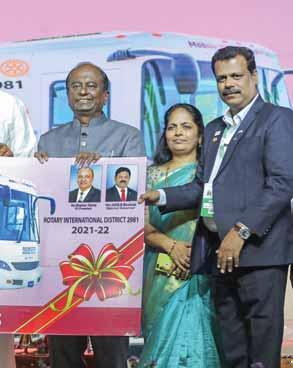


Tamil Nadu Legislative Assembly Speaker M Appavu launching the mammography bus in the presence of (from L) DG S Balaji, Conference chairman M A Mohamed Ziaudeen, Justice R Subramanian, RI President’s Representative Raja Seenivasan and his wife Jayanthi, and DRFC V Raman.
Rotary District 2981, led by DG S Balaji, celebrated its district conference in Chennai for three days recently. To commemorate the event the district launched three humanitarian services — a mammography bus worth `1.75 crore that will be driven across Tamil Nadu and Puducherry to help early detection of breast cancer; Project Orange worth `2.25 crore to set up 16 vision centres across Tamil Nadu; and three ambulances to serve patients. The ambulances were given to three Rotary clubs chosen through a lucky draw at the conference and the clubs will use the vehicles to help underprivileged patients. The projects were funded through global grants and sizeable contribution from Rotarians.
DG Balaji walked the talk by contributing more than `1 crore towards these projects and he became the district’s first AKS member, said RID 3232 PDG V Raja Seenivasan who was the RIPR for the conference. Appreciating the conference for taking up a good mix of Rotary topics and other meaningful sessions, he said that the event can be easily rated as one of the best conferences. This year the district, with a membership strength of
6,500 Rotarians, added 1,500 new members and contributed about $300,000 to The Rotary Foundation. “This is no mean achievement as there are no big cities in this district,” said the RIPR.
The district includes 135 Rotary clubs across seven revenue districts — Thanjavur, Tiruvarur, Nagapattinam, Mayiladuthurai, Cuddalore, Puducherry and Karaikal.
Speaker of the state Legislative Assembly M Appavu, the chief guest, appreciated the district’s Rotary clubs for their community service activities, especially the adoption of 135 backward villages. He said that the project was similar to the state government’s programme to transform villages and equip them with proper infrastructure. Justice R Subramanian, Judge, Madurai Bench, Madras High Court, was the guest of honour. He commended Rotary’s women’s empowerment initiatives and urged the Rotarians to educate schoolchildren on personal hygiene and adolescent health.
MA Mohamed Ziaudeen was the conference chairman. A variety of cultural programmes and distinguished speakers drawn from various fields kept the audience engaged and entertained throughout the conference.
Doing good with TRF help
WinS project at Rasipuram school
RC Rasipuram, RID 2982, implemented a global grant project at the Sacred Heart Higher Secondary School and turned it into a Happy School with a host of new sanitation facilities. The project worth `27 lakh benefited more than 1,000 students.
Two smart classrooms, 25 desktop computers, an RO unit for drinking water, an exclusive toilet block for girls with sanitary pad incinerator and a handwash station were executed as part of the Rasi Rotary Happy School Project. “A need assessment was done by the club’s Foundation Committee by visiting the school and interacting with the school management committee and the headmaster,” said NP Ramaswamy, primary contact of the club.
While training of teachers in the operation of a smart class was given by the vendor Tata Edge, the hands-on training in computer education was provided by ICT teachers from the State Council of Educational Research and Training. The club roped in
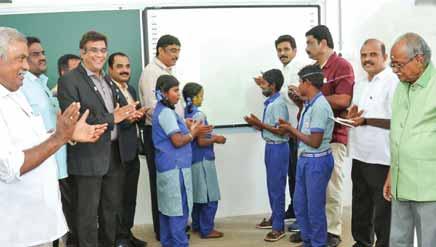
A smart classroom being inaugurated by DG K Sundharalingam (third from L) in the presence of PDG KS Venkatesan (second from L), project chair S Balaji, club president Anbalagan (third from R) and club contact NP Ramaswamy (R).
an NGO — Integrated Development Initiatives and Alternatives Foundation (INDIA) — to teach students effective use of handwash station and toilets.
RC Kent, RID 5030, the global partner contributed $7,000 for the WinS project. “We completed the project in four months and inaugurated the facilities to coincide with the reopening of the school after a long spell of Covid lockdown.”
DG K Sundaralingam, IPDG KS Venkatesan, district stewardship chair PDG TS Shanmugasundaram and DRFC Babu Kandaswamy were present at the inauguration of new WinS facilities. Club president Anbalagan presided over the inaugural event. Past president S Kathiresan and project chair S Balaji spoke about the implementation process.
RC Deonar nurtures RCC for 25 years
Vivek Khandelwal

For more than 25 years, the members of RC Deonar, RID 3141, have nurtured the concept of Rotary Community Corps (RCC) in the Karjat taluk of Raigad district, Maharashtra.
The work at an RCC is always a joint partnership between the Rotarians and the RCC team comprising the villagers residing in the area. The villages near Deonar have seen considerable development since the club’s intervention.
It all started with Shelu, a village in Karjat taluk where the club installed its first RCC. Today the club has installed five RCCs covering 46 villages in this taluk, transforming the lives of over 100,000 people.
The journey began with a focus on polio eradication in the village where several children were affected by polio.
With the help of the RCCs the club had sponsored 130 polio corrective surgeries across the villages and this helped in deepening the bond with Rotary among the locals.
The RCCs helped in identifying a group of villagers for a vocational training (VTT) programme to Israel that was done with an intent to understand agricultural practices

Clockwise: A hand operated borewell being inaugurated by Rtn Usha Desai in the presence of members of RC Deonar and RCC members; Village children perform a prayer song at an RCC installation; AKS member Kulbhushan Jetly inaugurates a hand operated borewell in a village; Classroom furniture sponsored by an RCC for a village school.
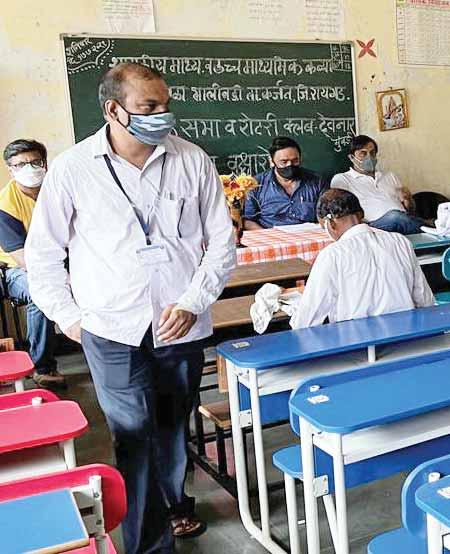

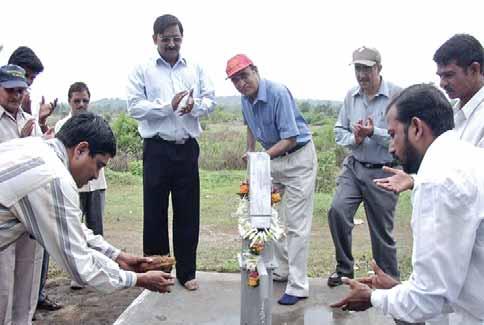
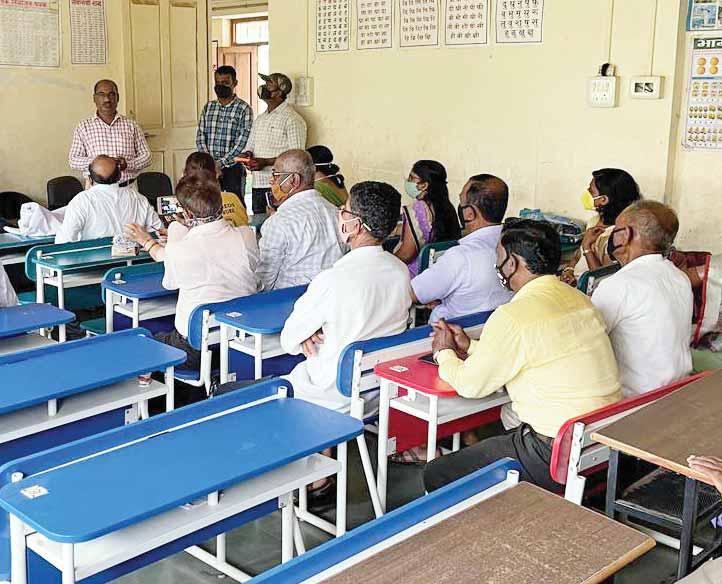
and improve crop yield. Over the years, the learning has immensely contributed to enhancing the local produce.
Other areas where the RCCs have helped in uplifting the lives of people include encouraging organic farming and women’s empowerment programmes. Village development initiatives include check dam projects, providing drinking water for village communities and schools, public utility toilet blocks. medical facilities, upgrading infrastructure in schools, promoting sports in the villages and vocational training for youth and women.
While the above may not be an exhaustive list, what is crucial is consistency in ideation leading to implementation and ensuring sustainability is monitored.
Club members Kulbhushan Jetly, Satish Lamba, Jhankar Gadkari, Ajit Pappu, Nagesh and Kannan have contributed immensely to the ongoing development. With the change of guard every year, each president has given strong support to the continuation of projects and initiatives that have been running for years.
The development of leadership at the local level plays a significant role and that is where leaders like Arjun Tare, Sitaram B, and many such pillars have made the RCCs what they are today.
One of the remarkable transformations that has come through this dedicated work is building new lines of leadership. In Oct 2021, RCC Bhivpuri appointed its first woman president, Archana Deshmukh.
The writer is member of RC Deonar, RID 3141





